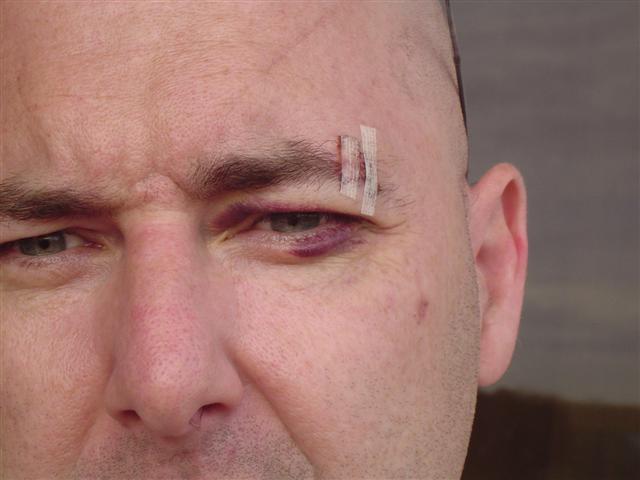you know you have been in a country long enough when you run out of normal conversation items. language, food, weather, politics; these are all subjects that have been discussed and discussed. naturally, you move onto other things. you are accepted a bit in the community, and people understand you are interested in knowing the differences between your home community and the community in your adopted home. then, without even trying you stumble over something that you realize has opened up your view of the cultural differences in ways you never expected.
this happened to me recently, and the enlightenment is both interesting and disturbing. i was talking to a malay and asked about the twelve year old nephew's "bar mitzvah". this, of course, was meant to be a joke. i assumed the malay community would have a ceremony for welcoming an adolescent male into adulthood; but using the jewish word for the transition was meant to be funny. i actually should have expected the person to not have known the word, or to mistake the meaning, but the conversation that followed was really not what i meant to discuss.
to understand, you need to grasp the dynamic of a open and direct westerner talking to a shy and reserved malay (muslim). over time, living in a different culture, you learn to avoid some subjects, or to talk about subjects without talking about the subjects. but this one, it one just came pouring out like breaking the front of a fish tank. there was no way ignore the soggy floor with fish flopping around once the misunderstood word broke the barrier.
when i said, "bar mitzvah", the answer was, "well, you have seen the malay boys walking around holding their sarong in front of them like a tent". i had seen them walking and holding the skirt-like material out at arms length. it had never bubbled to the top of the list for me to ask about. a few beats passed, we were both confused and considering what the other was talking about. we had clearly stumbled into an area of danger in the conversation. during the semi-awkward silence, the wheels where spinning. what was the relationship between passage into adulthood, a tented sarong and a jewish word used as a joke. then it hit me...
i asked, "do you mean they are having a bris at 12"?
there was certainly no way bris was a word that would be understood, but i could simply not say the word circumcision. besides the cultural discomfort, the consideration of the trauma (physical if not emotional) resulting from having the most sensitive part of male anatomy cut when he is old enough to remember it for the rest of his life is... well, i just had to retreat into a word what would give me a moment to process the idea.
circumcision is common in the US, it is less common world-wide. a bit of research following this conversation found that 30% of the global male population has been de-skinned; of those 68% of them are muslim. i was told that it was obligatory and that it is required at this age. as usual the research does not match the local understanding. circumcision is not within the quran, it is haddith. it is also not a rule, but a suggestion, one that is based on suddah (the trodden path). the most interesting element of this is that the tradition is not arabic, but jewish. the muslims follow the practice based on the early islam communities time in medina where they picked up many of the jewish traditions.
i came to terms with circumcision a "long time ago" following a question i asked my mother. she sat me down and explained a few things. things which influenced my own decision to include my son in the ranks of the clean-cut male community. but there are those that are not as supportive of the procedure. some people feel making the decision for an infant is equal to torture of the child. torture that can scar them emotionally, the physical scars are assumed, for life. they also worry that the elimination of sensitivity in that area will reduce the enjoyment of use at a later point in life. read the wikipedia article on circumcision, its very interesting.
but, waiting until puberty? why would anyone allow their child to wait until a time when they will remember it? worse, to do it at a time where the body part in question has begun to find reasons of its own to become active. boys this age tend to react largely to random thoughts and by simply waking up in the morning. what is the rationale? i was told by one person that they were supposed to wait because they were muslims; not true it is purely a malay cultural tradition, one that follows other polynesian (read pre-islamic) standards. someone else told me young men do this so they are clean for their future partners, confirming my assessment of the practice.
a cynical western view on this steps into clear view. the evidence, go research if you don't agree, says the following:
rather than conducting the procedure in the first days of life as done in the west, as the jews and other muslims do, malays wait until the male begins to mature and show signs of sexual development. his family tells him his penis is dirty and needs to be partially removed. they then publicly, this used to be done as an open ceremony in middle of the kampung, and now is marked by tented sarong, perform the act. for the next few weeks anytime he as a thought which would cause him to grow, there is severe pain. the lesson beyond needing to accept that he was dirty, is that sexual thoughts will bring pain and suffering. some in the west consider it torture at 7 days of age, a time that we do not remember, how do they feel about this delayed practice that is remembered.
i can't seem to stop thinking about this. it's like pulling up to a car accident and slowing down to look. i know it's wrong, but we rationalize slowing down as being done to see if you can help. helping here would be to say, if your child will have this done, do it at a time when there is no lasting memory. let him believe his private part was always clean and to have no memory of anything else.
otherwise the lesson is he is dirty, sex is bad and this pain is all related to the jews. maybe i do understand malaysia better.











Hi, very interesting blog today. Learnt some interesting facts about something most malaysians just accept as cultural traits. :)
ReplyDeleteI'm totally against circumcision of children of either sex at any age, but if you're going to do it, it makes sense to wait. Doing it to a newborn is the worst possible time - it's more dangerous, it hurts more, and the results aren't as good cosmetically.
ReplyDeleteWhat makes you think that intact male genitalia are unclean btw? Women's genitals are harder to keep clean than men's, but they seem to manage without surgery. Well, in most countries anyway.
The Wikipedia articles on circumcision are all heavily monitored (censored) by a pro-circumcision activist who uses the Wikipedia rules like a bludgeon. Example: there is an article on "foreskin fetishism" because someone once mentioned it in a scientific paper, but not on "circumcision fetishism", even though circum-fetishists have websites, a name for themselves ("circumsexuals") and an annual convention. No site is unbiased, but at least a pro-intact site like www.circumstitions.com makes its agenda plain.
ReplyDeletei am going to assume you guys are not normal readers, do you have some agent running to find postings on circumcision?
ReplyDeletemark, i had to smile at your reference to the cosmetic aspects of this... honestly, if i ever run into a person who looks at my penis and tells me it is not pretty enough... well that would be interesting to know about, and i am sure would be a great blog entry for me to write.
Stainedhead it's great to see that your travels are making you question the justifications for ritual genital mutilation but you need to take your questioning a step further.
ReplyDeleteFor example you don't question your central assumption that a baby forgets the trauma of his genital cutting, but science disproved this theory in the 1990s.
Taddio et al showed clear evidence of a memory of circumcision trauma in babies - she showed that those who'd been circumcised without anaesthetic showed a significantly stronger response to pain months later. Those who assessed the infants' pain reaction were blinded ie they didn't know which babies were which. The researchers concluded that circumcision may cause an 'infant analogue of post traumatic stress disorder' . We don't know if this lower pain threshold is lifelong - but it may well be.
Many people around the world use the arguments you've used to justify cutting the folds and flaps from a little girl's vulva. In parts of Africa, the Middle and Far east this is done in the first days of life using just the same argument you do, 'so she'll forget'. Even if she did forget, does this make it ok? If not, why not?
We know that a woman gets smegma at least as much as a male, and if you're familiar with our anatomy you'll know we have a great many flaps and folds where it hides. Unlike you when washing our bits we'd need a mirror to check whether it's been done properly. And clearly there are some girls who don't pay too much attention...as some men have reported when they've been down there...
Clearly also some men hate dangly labia, so if they're obvious in a baby daughter should he be allowed to have them snipped off? After all he could point out she'd be less likely to get vulval cancer as well as smegma....and there's evidence from Africa it would significantly lessen her risk of HIV.
I attended an FGM awareness day recently and was struck by the comparisons. Pictures were shown of an excised vulva, and the presenters expressed how difficult it is to get women not to do this to their daughters when they consider the smooth look so much easier to clean and attractive to men...
Later a woman from West Africa talked of her cut, and said she had 'no psychological trauma' as she was cut at eight days old...
Yes FGM is also promoted as reducing sexual sensation, which it does without necessarily preventing orgasm. MGM has also been promoted for the same reasons by Anglo-Saxon Victorians, and by the great Maimonides himself!
Your father taught you that 'you can ask any question but you need to be prepared to deal with the answer'...
The answer you need to absorb and think about here is:
a. ritually cutting a child's genitals is horribly painful and traumatic at any age. It's also a gamble with their sex life - in interfering with important nerve pathways either hypersensitivity or difficulty in climaxing can result.
b. every man,woman, boy and girl has the right of free will and bodily integrity - in this case this means the right to choose soap over surgery, and to choose their religious practices voluntarily
i live in a muslim country, one that sometimes practices female circumcision. it's a practice that is clearly barbaric and misogynistic.
ReplyDeletei am pretty sure my parent's had a doctor use anaesthia, i am sure my son's doctors did. i have been to bris, even then the mohel used alcohol to help the baby, and caring words to assist the adults.
i am not advocating, and if i were it would be a position that you seem to agree with. i can not say which way is better, i know what i am used to.
without setting you off the choice for my son was made based on hearing the non-cut version called a mud-dripper in college. having your son be singled out with that term would also have been an issue also. the rationale was that it outweighed the risks when done in a modern medical facility.
thank you for not second-guessing our choice.
I found your blog through a Google alert, which tells me about references to circumcision, and I would imagine Hugh7 found it the same way.
ReplyDeleteAs far as the cosmetic thing goes, if you're happy with your equipment, that's great. There are a lot of problems with circumcision performed on newborns though, which just don't happen with males circumcised at a later age. I'm not talking about the very rare cases of serious infection, amputation or death, but the minor stuff, like skin bridges and skin tags:
http://www.circumstitions.com/Botched1.html
Basically, on a newborn, the surgeon is dealing with something that's much smaller, and it's much harder to decide how much to cut off. Also the foreskin of a newborn boy is fused to the glans, so and there are major problems with adhesions. About 5% of neonatal circumcisions require a "revision" - a second operation to correct things. I've never heard of an adolescent or adult circumcision having to be repeated.
Even if circumcising boys was a good idea, doing it to newborns just doesn't make sense.
You describe female circumcision as a practice that is clearly barbaric and misogynistic, but the version of it in Malaysia really isn't that different from the usual form of male circumcision. If you debate with the people that do it, they'll point out the similarity with male circumcision. Even if you see a fundamental difference, they don't. They probably have insulting words for uncircumcised women too, but that doesn't justify its continuation. Parents that circumcise say they don't want their kids to be the odd ones out, but it still goes on even in countries where it used to be common, but is now a minority practice (Australia, New Zealand, Canada).
Did you know that the USA used to practice female circumcision too? There are references to it in the medical literature up till the late 1950's comparing it to, and recommending that it be performed for the same reasons as male circumcision
If you were circumcised as a newborn, it's unlikely that any anesthesia was used btw. You certainly wouldn't have had general anesthetic if you had it done. Even today, almost half of US circumcisions on newborns are performed without anesthetic, despite it being against AAP guidelines for over ten years. It still hurts after the anesthetic wears off too.
ReplyDelete